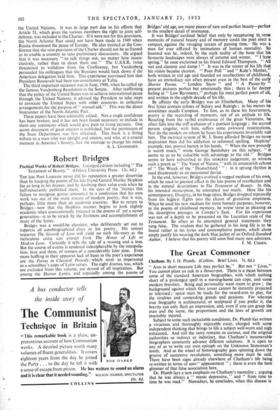Robert Bridges
Poetical Works of Robert Bridges. Enlarged edition including" The Testament of Beauty." (Oxford University Press. 12s. 6d.)
THE late Poet Laureate never did his reputation a greater disservice than by keeping the poems (A his late friend Gerard Manley Hopkins for so long in his drawer, and by doubting their value even when he half-reluctantly published them. In the eyes of the 'thirties this failure to recognise genius amounted to a confession that his own work was out of the main stream of modern poetry, that it was, perhaps, little more than an academic exercise. But to return to Bridges—now that the Hopkins manner begins to look slightly academic when conventionally imitated in the poems of yet a newer generation—is to be struck by the freshness and accomplishment of many of the lyrics. Bridges was a would-be classicist, who deliberately set out to suppress all autobiographical clues in his poetry. His sonnet sequence The Growth of Love will yield no such life-story as the meticulous critic can extract from The House of Life or Modern Love. Certainly it tells the tale of a wooing and a loss. But the course of events is rendered indecipherable by the interpola- tion, here and there, of sonnets of a considerably later date. Even more baffling in their apparent lack of basis in the poet's experience are the Poems in Classical Prosody,' which seem as impersonal as a schoolboy's copy of Latin verses. The eight dramas, too, which are excluded from this volume, are devoid of all inspiration. But among the Shorter Lyrics, and especially among the poems of Bridges' old age, are many pieces of rare and perfect beauty—perfect to the smallest detail of assonance.
It was Bridges' cardinal belief that only by recapturing livers° moments of natural beauty and of memory could the poet erect a ramparkagainst the ravaging stream. of passing time.- He was a man for ever afflicted by intimations -of human mortality. So haunted was he, indeed, by the stark reality of the bone that his favourite landscapes were always of autumn and winter. "I hate spring," he once exclaimed to his friend Edward Thompson. "All wet and clammy and damp ! " It was in the winter of his life that his vision became clearest. " Poor Poll " and" Kate's Mother," both written in old age and founded on recollections of childhood, have an immediacy not often present even in the best of the early Shorter Poems. " London Snow " and " A Passer-by present pictures perfect but emotionally thin ; there is far deeper feeling in " Low Barometer," perhaps his most perfect poem of all, and written in the eighth decade of his life.
By affinity the early Bridges was an Elizabethan. Many of his first lyrics contain echoes of Sidney and Raleigh ; in his metres he sometimes recalls Campion. To him, as to these his forerunners, poetry is the recording of moments, not of an attitude to life. Reacting from the verbal exuberance of the great Victorians, he often falls into the stiff archaism of a poetical language ; the second person singular, with him, suffers some awkward resurrections. Nor do the models on whom he bases his experiments invariably suit him. The metrical system of W. J. Stone afforded Bridges no more inspiration than did his addiction to reformed spelling. Hopkins' example, too, proved barren in his hands. "When the new prosody is worth much," wrote George Saintsbury on this subject, "it seems to us to be reducible with advantage to the old." Bridges seems to have subscribed to this mistaken judgement, as witness such a poem as" The Voice of Nature," with its amateurish echoes of" The Wreck of the Deutschland ' " : in it sprung rhythm is used disastrously as an occasional device.
In the end, however, Bridges evolved a rugged medium of his own, which he used to greatest effect in the late poems of recollection and in the natural descriptions in The Testament of Beauty. In this, his intended masterpiece, he attempted too much. Here like his contemporary, Doughty, in his huge epics, Bridges dropped repeatedly from his highest flights into the chasm of grandiose emptiness. When he used his new medium for more homely purposes, however, in the poems of childhood memory, he wrote verse as pleasing as the descriptive passages in Cowper's Task. For his experience was not of a depth -to be presented on the Lucretian scale of, the Testament. So often as he attempted general statements they rang false. The wisdom that he gathered in his long life is to be found rather in his lyrics and contemplative poems, which alone amply justify his wearing the dark blue jacket of an Oxford Standard Author. I believe that his poetry will soon find many new admirers.
J. M. COHEN.


































 Previous page
Previous page